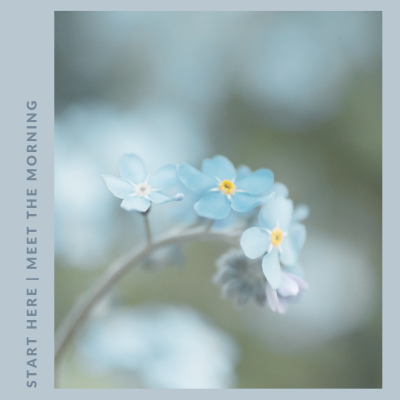5 Things I Want You to Know About Grief After Losing a Baby
by Emily Larzabal
It’s been about seven months since we heard “there is no heartbeat” at 20 weeks pregnant with Cecilia and then delivered her stillborn. I’ve moved from a textbook relationship with grief as a counselor to a very personal one. I’ve become very passionate about serving women walking through the death of their babies. I believe grief isn’t talked about enough and therefore not understood by many - usually because of fear of making people uncomfortable or hurting people’s feelings. So, I’m stepping into this space to hopefully create awareness.
So far I’ve learned:
1. Grief can’t be appeased. I’ve never wanted two opposing things at the same time like I have the last few months. I’ve wanted: to talk to people and isolate, for everyone to know and no one to know, for Cecilia’s death to be “just a miscarriage” and for it to be a really big deal, for people to ask me how I’m doing and to leave me alone, to feel “normal” again and for this pain to never go away. There’s just no winning with grief. I realize how complicated this makes being friends with someone who is grieving. Please be patient with us.
2. I don’t want or need 50 people to sit in my sadness and grieve with me. I need about 3 and I’ve been lucky enough to have them. (What a beautiful example of God’s grace in this season. I am well aware that this isn’t true for many people.) I’ll be forever grateful for the women who have walked these days WITH me. I am convinced they have felt the depths of my pain and shouldered some of the burden. There’s just nothing like the intimacy of sitting in the trenches together.
That being said, I’ve needed an army to remember Cecilia, speak her name, pray, feed my family, and acknowledge my grief. Just because you’re not “one of the three” for someone’s grief process doesn’t mean you’re not still an essential part of the process. It’s not really about what this army has done, but that they’ve done something. You can’t do the perfect thing to take someone’s grief away - it’s not about that. All you need to communicate is that you remember. In those early days seeing something beautiful, tasting something beautiful, hearing something beautiful, smelling something beautiful was grounding for me. Maybe start there with your grieving friend.
3. Grief has changed me. My empathy grew overnight. My willingness to sit in the sadness instead of pushing on towards “okay” increased, and I’ve never been more comfortable asking for what I need. I welcome these changes but also fear the lack of acceptance from others of this new version of myself. I sense a “grief timer” might go off with people and they will start to wonder, “Hasn’t she been sad long enough?” Someone told me recently “I think you’re allowed to be in charge of that so-called timer,” and I like that, and am trying to live that way.
4. Tenderness, though not necessary, is appreciated. Those who have not treated Cecilia’s death casually have communicated so much validation to me. This is the difference between “I’m sorry for your loss” and “the unimaginable has happened. I’m so sorry your baby died.” There’s a difference between choosing to step into the sadness, even if just for a moment, and viewing my grief as a spectator from afar, almost as if scared to “catch” my sadness. There’s a difference between being sad that I’m sad and actually being sad yourself. Since culturally we see happiness as good and sadness as bad (which is not true, by the way!), I think this one is especially hard for people. I dare you to try it on behalf of your friend. It will hurt. It’s supposed to.
5. Apologies have created a safe space for me to express when I’m hurting. Life is a minefield right now. I’m going to get hurt, but when people have tried to anticipate what might be painful, genuinely apologized when they’ve recognized they said or did something that was insensitive, and then allowed me to hurt instead of trying to fix it I have been encouraged to keep sharing instead of pushing people away. You’ll probably say or do the wrong thing if you’re showing up. Just show up humbly.
There’s so much more I could say, but if there’s one thing I want the world to know about grief, it’s that it takes time and will never fully go away, no matter how short the life we’re grieving. Don’t rush us and don’t try to tell us otherwise.
Meet the Author: Emily Larzabal
Hi! I'm Emily. I'm a wife and mom and very recently chose to press pause on my career as a counselor to stay home with our four year old daughter. While I may not be sitting in the therapist chair these days, I am very passionate about mental health and helping people get through the difficult things of life. About a year ago my husband and I started the process to become foster parents, then found out we were pregnant and had to change our plans. Four months later we lost Cecilia and were left with so many questions. While I received amazing support after our loss, I regularly hit up against the awkwardness of a culture that is not grief informed. So, in a new way, I continue to do my best to advocate well for those of us who are hurting in my friendships, church family, and community. Today, my husband, daughter, and I are navigating the roller coaster of hoping to add a baby to our family. We love gardening, a good board game, and making yummy food together.
Connect with Author: Instagram @_em_grace
10 ways to love a grieving friend
A SIMPLE FREE GUIDE THAT WILL HELP YOU KNOW HOW TO LOVE A GRIEVING MOM.
sympathy cards
tell a grieving mom you are thinking about her, that she is loved and not forgotten.


































